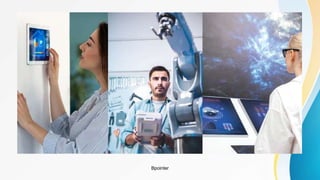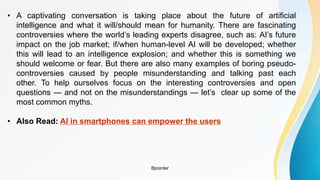Artificial Intelligence – with calculative risk
- 1. Artificial Intelligence – with calculative risk Bpointer
- 2. Bpointer
- 3. • Get ready for Artificial Intelligence (AI) to enter our lives thanks to recent world changes. Artificial Intelligence (AI), or machine intelligence, is the field developing computers and robots capable of parsing data contextually to provide requested information, supply analysis, or trigger events based on findings. Through techniques like machine learning and neural networks, companies globally are investing in teaching machines to ‘think’ more like humans. Bpointer
- 4. • First, solve the problem. Then write the code. • AI has the potential to greatly improve the human condition. In particular, AI-will drive advancement in biotech, medical, climate and agriculture technologies among others – these changes will be hugely beneficial to humans. There is also great scope for AI to support people with disabilities. The more data AI systems have, the faster they will get better. But AI’s need for data can pose a problem for some businesses and organizations that have less data than others. • Most AI that surrounds us today is narrow AI, including Google Assistant and Siri, which are not close to having human intelligence. Siri for example understands spoken words, enters them into a search engine and returns results. Bpointer
- 5. Most AI that surrounds us today is narrow AI, including Google Assistant and Siri, which are not close to having human intelligence. Siri for example understands spoken words, enters them into a search engine and returns results. • Narrow AI has relieved workers of boring, routine and mundane tasks, including sifting through huge volumes of data and analyzing it to produce results. The ANIs can be seen as building blocks of more intelligent AI we may see in the future. Bpointer
- 6. Bpointer
- 7. Bpointer • A captivating conversation is taking place about the future of artificial intelligence and what it will/should mean for humanity. There are fascinating controversies where the world’s leading experts disagree, such as: AI’s future impact on the job market; if/when human-level AI will be developed; whether this will lead to an intelligence explosion; and whether this is something we should welcome or fear. But there are also many examples of boring pseudo- controversies caused by people misunderstanding and talking past each other. To help ourselves focus on the interesting controversies and open questions — and not on the misunderstandings — let’s clear up some of the most common myths. • Also Read: AI in smartphones can empower the users






